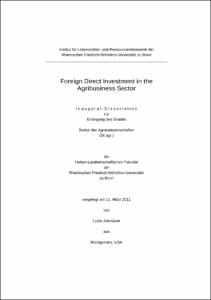Adenäuer, Lucie: Foreign Direct Investment in the Agribusiness Sector. - Bonn, 2011. - Dissertation, Rheinische Friedrich-Wilhelms-Universität Bonn.
Online-Ausgabe in bonndoc: https://nbn-resolving.org/urn:nbn:de:hbz:5N-25485
Online-Ausgabe in bonndoc: https://nbn-resolving.org/urn:nbn:de:hbz:5N-25485
@phdthesis{handle:20.500.11811/4730,
urn: https://nbn-resolving.org/urn:nbn:de:hbz:5N-25485,
author = {{Lucie Adenäuer}},
title = {Foreign Direct Investment in the Agribusiness Sector},
school = {Rheinische Friedrich-Wilhelms-Universität Bonn},
year = 2011,
month = jun,
note = {Foreign Direct Investment (FDI) has increased strongly since 2003, especially into the agribusiness sector. This development has rarely been analysed in recent literature. Therefore, this thesis aims at analysing different aspect connected with FDI flows in the Agribusiness sector such as the different mechanisms that lead to the appearance of FDI flows and the impacts that they can have on host countries in particular on their agribusiness sector. Africa and South America are chosen as major host regions and the EU15 as a major region which invests abroad. The study is structured in four main parts.
First a general introduction on the global development of FDI flows and the theoretical placement of this study is given. The objectives of the thesis are stated and the three main analyses are shortly summarised regarding the motivation, the approach and the main results as well as the specific limitations. Key findings regarding the overall scope of the thesis are derived and general limitations identified. Finally, the perspectives for further research are stated.
Following, the specific performance characteristics of European agribusiness firms are identified through which a differentiation between firms that invest abroad and those that do not is possible. It is concluded that European Multinational Enterprises are characterised through a higher productivity and lower labour and input costs. Further, they are larger in size and have a higher debt to equity ratio.
The subsequent analysis identifies the host country characteristics necessary for attracting a certain form of FDI flows (either vertical or horizontal). Thereby, the Mediterranean and the Mercosur countries are chosen as host countries for EU15 investment flows. The regression results indicate that mainly vertical FDI flows (efficiency seeking) appear between the EU15 and the Mediterranean countries whereas horizontal FDI flows (market seeking) dominate into the Mercosur countries. The implications on the trade flows between the home and host countries seem to be complementary for the Mediterranean countries and substitutional for the Mercosur countries.
Finally, an analysis on the impact of highly increasing FDI inflows on a specific host country – Ethiopia – is carried out. Theory points out that depending on the existence of transmission mechanisms FDI flows can lead to economic growth and through this to the reduction of poverty. The economic and social impact of FDI inflows on Ethiopia is mainly positive. Poverty can be reduced through high FDI inflows. Existing environmental conflicts on land and water are bound to increase if no policy framework is implemented.},
url = {https://hdl.handle.net/20.500.11811/4730}
}
urn: https://nbn-resolving.org/urn:nbn:de:hbz:5N-25485,
author = {{Lucie Adenäuer}},
title = {Foreign Direct Investment in the Agribusiness Sector},
school = {Rheinische Friedrich-Wilhelms-Universität Bonn},
year = 2011,
month = jun,
note = {Foreign Direct Investment (FDI) has increased strongly since 2003, especially into the agribusiness sector. This development has rarely been analysed in recent literature. Therefore, this thesis aims at analysing different aspect connected with FDI flows in the Agribusiness sector such as the different mechanisms that lead to the appearance of FDI flows and the impacts that they can have on host countries in particular on their agribusiness sector. Africa and South America are chosen as major host regions and the EU15 as a major region which invests abroad. The study is structured in four main parts.
First a general introduction on the global development of FDI flows and the theoretical placement of this study is given. The objectives of the thesis are stated and the three main analyses are shortly summarised regarding the motivation, the approach and the main results as well as the specific limitations. Key findings regarding the overall scope of the thesis are derived and general limitations identified. Finally, the perspectives for further research are stated.
Following, the specific performance characteristics of European agribusiness firms are identified through which a differentiation between firms that invest abroad and those that do not is possible. It is concluded that European Multinational Enterprises are characterised through a higher productivity and lower labour and input costs. Further, they are larger in size and have a higher debt to equity ratio.
The subsequent analysis identifies the host country characteristics necessary for attracting a certain form of FDI flows (either vertical or horizontal). Thereby, the Mediterranean and the Mercosur countries are chosen as host countries for EU15 investment flows. The regression results indicate that mainly vertical FDI flows (efficiency seeking) appear between the EU15 and the Mediterranean countries whereas horizontal FDI flows (market seeking) dominate into the Mercosur countries. The implications on the trade flows between the home and host countries seem to be complementary for the Mediterranean countries and substitutional for the Mercosur countries.
Finally, an analysis on the impact of highly increasing FDI inflows on a specific host country – Ethiopia – is carried out. Theory points out that depending on the existence of transmission mechanisms FDI flows can lead to economic growth and through this to the reduction of poverty. The economic and social impact of FDI inflows on Ethiopia is mainly positive. Poverty can be reduced through high FDI inflows. Existing environmental conflicts on land and water are bound to increase if no policy framework is implemented.},
url = {https://hdl.handle.net/20.500.11811/4730}
}






